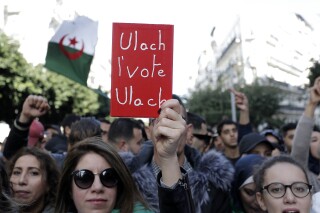Low voter turnout and lack of competition could spell a de-facto win for Algerian President Tebboune

Algerian demonstrators take to the streets in the capital Algiers to reject the presidential elections, in Algeria, Dec. 12, 2019. Banner reads “Why vote, why?” (AP Photo/Toufik Doudou)
DATE OF ELECTION
December
TYPE OF ELECTION
Presidential
WHO’S RUNNING
In Africa’s largest country by territory, few viable challengers are expected to come forward to run against 78-year-old, military-backed President Abdelmajid Tebboune. He rose to power in 2019 after pro-democracy protests led to the ouster of his 82-year-old military-backed predecessor. But despite his promises to reach out to young people whose energy drove the Hirak movement that year, old realities quickly reasserted themselves in the oil-rich North African nation of 45 million people. Five years after many activists boycotted the elections that vaulted Tebboune to the presidency, leading opposition parties have expressed doubt about whether the 2024 race will be open and transparent.
WHY IT MATTERS TO THE WORLD
Algeria is a member of the United Nations’ Security Council and key security partner for western countries concerned about extremist threats expanding throughout Africa. The resource-rich country has one of the continent’s largest militaries and its role as an energy producer became even more important after war in Ukraine forced Europe to search for replacements for cheap Russian natural gas. A Tebboune victory in a low turnout contest would further cement the power of Algeria’s aging elite five years after pro-democracy protestors toppled the former president and led the army to jail many of his allies in the political elite.
For more on the global elections, click here
To see how other 2024 elections could affect the world, click here
